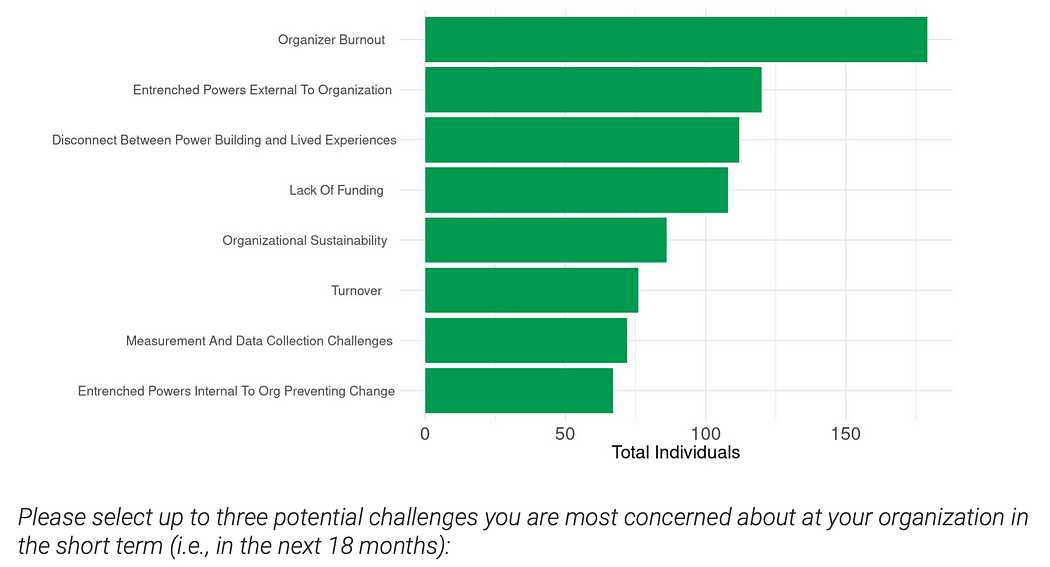Why community organisers are so prone to burnout
Naming our vulnerabilities — with an invitation at the end
Hello all,
I hope this week has treated you well so far. Welcome to everyone who joined - it’s nice to see new names of people keen to learn about human connection. :)
Today’s post is intended mainly for community leaders and organisers — especially those who may be at the verge of burnout.
As I’m learning more about the nature of community work, I’m realising that burnout is one of the biggest risks that may prevent us from making the meaningful change we’re here for. Below, I list some reasons for that.
At the end, I’ll also include an exciting invitation for those of you tuning in from Edinburgh / the UK.
Let’s go!
A few weeks ago, I paused my engagement in the Authentic Connection Group I’d been running for almost three years.
I paused a Circling practice group I was facilitating with my friend.
I cancelled Wednesday morning meditations I’d been holding for a few months. (even though barely anyone was coming)
I also messaged the Community Working Group at The Salisbury Centre to say I may or may be skipping some meetings in the next few months.
I think I caught myself just before burnout. But that’s only because I’ve experienced burnout before, and I knew how the stage just before feels.
Otherwise, I was on a downward spiral to get overwhelmed and resentful again.
While this time I escaped it, I’m asking myself: Why is burnout such a normal condition among community organisers? Most people I know who do community work are exceptionally self-aware and well-versed in self-care. They typically have resources and knowledge to support themselves and keep their efforts at healthy levels.
And yet, organisers are among the highest-risk groups when it comes burnout. A poll by re:power shows it’s the biggest challenge political organisers are concerned about in the short-to-medium term of their work:

Why’s that?
Here are some of the possible reasons I see.
Community organisers care too much
First things first. When you care about something with all your heart, it’s easy to prioritize it above all else.
People who lead communities are often the ones who want to make an impact for collective benefit. They see the big picture, and they know it’s ugly. They are driven to change something.
And, because of the capitalistic system that shaped us all, they adopt the logic of “the more, the better.”
But doing more isn’t always the best way to make a difference. When you tell yourself you need to be “on” all the time and “do everything in your power,” you start losing perspective.
The truth is, you can’t change the world through your actions alone. It’s an organic change we’re creating as the human race. You doing two extra hours at the end of the day won’t significantly contribute to saving the planet.
On the other hand, it can easily contribute to burnout. That can cut you off from action for weeks, months, or even years.
Community organisers don’t always have the tools to collaborate
Connected to putting in too much of your own energy is the idea of collaboration. You’d think that community projects require collaboration by default. And, you’d be correct.
However, there’s also the question of how it happens. The truth is, community organisers don’t always know the right collaboration tools.
Many times, I’ve been a leader who seemingly shares power. I delegated tasks and invited others to step in but, in the end, I was the one holding the reigns. This often was a result of not being able to establish clear ways to collaborate, or… not trusting others fully.
If you’re an overachiever, you may have an ingrained belief that “your way is the best way” to do accomplish things. You may not ask for help because you’re convinced that you’d then need to go back to the task and correct it anyway.
Now, this may be true… but it can also be a trap. In community work, there is often not “one right way” to do things. Just because other people do it differently then you doesn’t mean it’s worse. Actually, you may be missing part of the picture that they’re seeing — and, accounting for.
Plus, even if you knew how to do it “better,” sometimes others can do it just… well enough.
Struggling with trust to delegate is just one common problem when it comes to community collaborations. Others I see are: lack of clear decision-making processes, poor communication, lack of confidence to delegate, and many others.
At the same time, relying on other people is key if you want to avoid burnout as a community leader. You don’t have to — and shouldn’t — carry the whole burden on your two shoulders.
Setting up good collaborations can help you distribute the weight.
Community organisers juggle too many balls
It’s not just about how much you’re doing.
It’s also about how many different projects / dreams / groups / jobs / tasks you’re involved in.
As you know, switching between tasks and contexts has its price. Community organisers often pay it in the form of burnout.
Many of us need to balance paid work and their heart’s work. Occasionally, these are one and the same. But form what I see around me, the deep, tedious community work doesn’t always pay well enough to rely on it for your livelihood.
So, there’s usually a host of smaller projects that community leaders need to keep track of. Not to mention networking and maintaining relationships with community members and friends, while trying to figure out what each relationship means. Not to mention the energy drain of social media, which feels like a place where you must be to tell people about your next thing.
All this is simply too much for a human brain. We have a limited capacity for holding different things in our brains. Chris Bailey calls this “attentional space.” If you overload it, you’re more likely to feel tired and detached — rather than motivated and engaged.
Managing your cognitive load is one of the biggest challenges as a community organiser. It’s hard but not impossible — and we should support each other in that task.
Community organisers don’t always look far into the future
According to re:power’s poll, only 32% of political organisers believed they’d still be in the field in five years. While political organising isn’t the same as community work, it points to the same problem:
People who want to make a difference don’t always think about their work long-term. More often, we come at it with a “sprint mindset.” We focus on short and maybe sometimes medium-term, because we want to see something happen, fast.
This is more of a structural than and individual problem. Funding rounds for community projects often last only a year or two. People don’t get enough support in their roles. High staff turnover in community organisations is seen as normal and not many managers are incentivised enough to prevent it.
At the same time, as community organizers, we’re wise to consider for ourselves what we want to achieve in the long-term. Maybe — just maybe — we can sift through the projects we’re taking on from a forward-looking perspective.
Because if you only see the next event and don’t strategize for the long-term — you may be contributing to your own burnout.
Adopting the long-game mindset requires patience. But I think it’s better to keep one steady project going for several years, rather than start five and drop them months later. (which I’m guilty of just now, with pausing a lot of my community groups…)
All of that is easier said than done. How do we change our mindset to a less intense, more collaborative and long-term one as community organisers?
What do we do to avoid burnout?
On the 1st January this year, I was sitting around a fire with a few of my friends. We were speaking about how we wanted to show up in the next twelve months.
Everyone was a community organiser, facilitator, leader, and/or artist in their own right. We all care about making a better world.
At the same time, we don’t want to sacrifice ourselves fighting a fight we may not even win.
One friend, Rick, said it all with one beautiful phrase: Try softer. He shared that, throughout his life, he had been told to always “try harder” if he wanted to achieve something. And, he was realizing this hadn’t worked so well for him.
Inspired by Rick, this is how I’m ending this piece. What would happen if, as community organisers and leaders, we tried softer? What if we could go a little slower? What if we took the pressure of saving the world, even just a little?
BONUS Invitation!

For those of you tuning in from the UK (and especially Edinburgh) I have a more practical invitation.
From 28–30th June, I’m organizing an Authentic Community Leadership Training and Banquet to help us all upskill and learn as community organisers.
Sara Ness and Geof Krum of Authentic Revolution are going to run this one. For those who don’t know them, they are a power-couple of masterful facilitators and trainers, specialising in community organising and communication. They are largely responsible for the Authentic Relating movement spreading across the globe. I also consider them my mentors.
Avoiding burnout as a community leader is one of the topics the training will address. If you want to know more, check out the FB event, the tickets page, or email me at hello@martabrzosko.com to ask questions.



